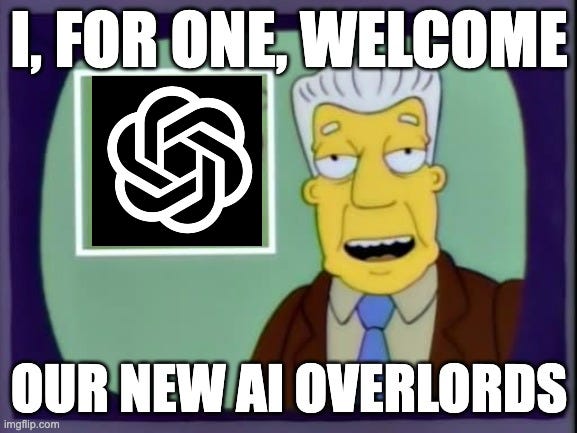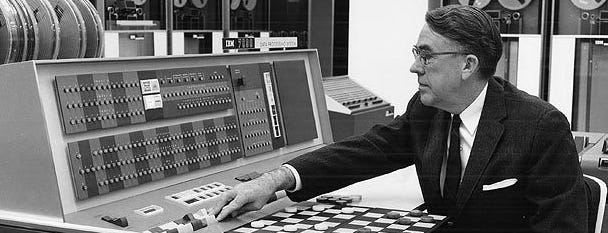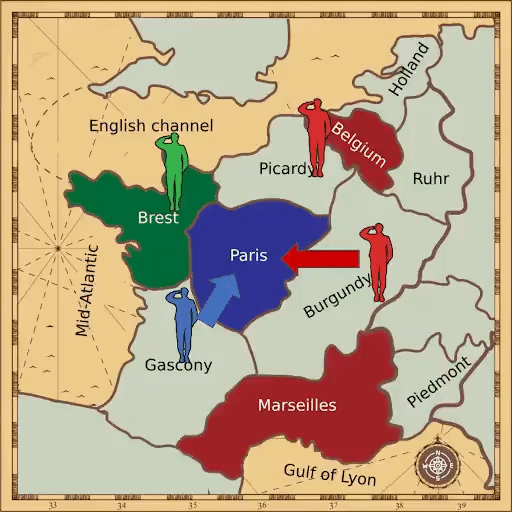There is no such thing as (artificial) intelligence
How to prepare for a future where computers are more and more useful. 🙀
Inside this issue:
How to play checkers
The age of artificial art
The end of content scarcity
How to play checkers
When I was young the ability to play chess with a high degree of skill was generally considered a mark of genius. Not necessarily the only way to be a genius, but one of the most clear cut and objective. Smart people were better at chess, so the people who were the best at chess were demonstrably very smart people. Perhaps the smartest?1 But chess doesn’t only require intellect — it also requires patience, focus and study. And there are other games that reward/require different levels of intelligence: go, checkers, poker, backgammon, stratego, Jeopardy.
There was no clear way to compare the difficulty of being a chess grandmaster versus a 9-dan traditional go player to a talented Jeopardy contestant. But over the course of the last few decades artificial intelligence has surpassed human skill in each of these domains one-by-one. AI defeated humans first in backgammon (1977), then in checkers (1994) then chess (1997), then Jeopardy (2011), then go (2015) and poker (2015) and now more recently stratego (2022).
Does artificial intelligence conquering things in that order mean that go players are smarter than Jeopardy players who are smarter than chess players? No, not really. Even games that require intelligence also reward other skills that computers could be better or worse at. Jeopardy requires language skills and response time. Poker and backgammon demand an understanding of probability and an appetite for risk. Chess and go masters must have strong pattern recognition and a knowledge of the history of the game. Checkers requires the patience to do something even though it is tremendously boring and dull. No game is a good proxy for pure intellect.
The only true proxy for pure intellect is a subscription to Something Interesting.
The reason that no game is a good proxy for pure intellect is because there is no such thing as pure intellect. I’m not being poetic here, I’m being literal. There is no such thing as general intelligence. That’s a consequence of my favorite mathematical idea of all time: the No Free Lunch Theorem. To oversimplify, the No Free Lunch Theorem states that there is no such thing as a 'universal' optimization across every possible problem set. Any attempt to optimize an algorithm (i.e. make it 'smarter') is implicitly optimizing it for a specific set of problems. The more you optimize an algorithm for one problem set the worse it will be at all the others. No free lunch.
In other words, you can’t make a computer universally smarter because there is no such thing as universally smarter. You can only make it better at chess. Or go. Or poker. Or international diplomacy.
I can’t imagine there will be any unintended consequences from teaching AI how to assemble and betray strategic alliances with humans to advance a military agenda.
The age of artificial art
Genius was once a quality we saw as exclusively human, but now every year there are fewer and fewer fields of genius where humans can reliably surpass their algorithmic competition. Judging from recent developments it seems likely that soon creativity will be engulfed in the same wave that has swallowed genius. These days any idiot with an iPhone can beat a chess grandmaster. Soon that will also be true of more subjective human pursuits like writing, painting, music and photography.
The improvements in these systems in a short amount of time has been staggering. They still have noticeable artifacts — image generators produce too many fingers and limbs, text generators can be confident and articulate and also totally wrong. But the progress is absolutely indisputable and the glimmers of the future are compelling. ChatGPT can write software. It can imagine recipes. It can write a Bible verse about how to remove a peanut butter sandwich from a VCR. It can compose a haiku about the fall of the petrodollar:2
The petrodollar reigns
Falls from its throne, power fades
New order rises.
Just as checkers is obviously simpler to play than chess it is also obvious that producing bland commercial product descriptions is easier than writing the next great American novel. But it is reasonable to project out from current trends and suppose that machines will eventually be better than humans at both tasks. At a minimum computers won’t take 11 years to deliver the next book in the series.
We have officially entered the age of artificial art — but it won’t be the end of human creativity, just as photoshop did not end photography, DJ sampling did not end music and the printing press did not obliterate the concept of calligraphy. Tools that must be wielded by artists are by definition not a threat to art. But they are a threat to artists. When art can be made at greater speed and quantity, fewer artists will be needed.
In my opinion the best comparison is probably the invention of the gramophone and the commercialization of recorded music. That was good news for music appreciation generally — suddenly everyone could afford to listen to the best musicians in the world! But it was terrible news for most musicians — why pay to listen to a local performer live when you could listen to a recording of the world’s best? I expect a similar consolidation to happen whenever a market is conquered by AI tools: the most successful artists will use those tools to supply a much larger share of the market overall. Consumers will get radically more art at a radically lower cost, but artists will be competing over fewer jobs.
In other industries the threat is more existential.
The end of content scarcity
The two most common reactions to the surge in recent AI developments are to panic or to be completely dismissive — but I don’t think either extreme is warranted. Anyone who has actually played with ChatGPT can tell you that while it is genuinely impressive it is also tricky to work with and easily confused. It’s not so much a mechanical genius as a talented impressionist with an impressively broad range of material — closer to a parrot than a professor. ChatGPT is not a system of general intelligence, it is a system designed to produce intelligent sounding text.
That’s still tremendously valuable! Intelligent sounding text is very useful and expensive to produce. Large language models can be used to generate commodity text more cheaply at scale: product descriptions, social media headlines, book blurbs, meeting notes, code documentation. Human efforts can move up the value chain to refining and overseeing content creation rather than producing text directly — just as visual artists can focus on prompting and curating a visual engine to oversee the creation of more art than they could ever produce themselves.
Art is actually ironically one of the safest careers in my opinion because it is ultimately driven by human taste, so there will always be a need for at least some human curation piloting the algorithm. In industries where good enough can be more objectively defined its not clear AI will require any human input at all. It’s possible the world will no longer need any paralegals or stock photographers or customer support specialists or commercial models or local journalists or even plucky young newsletter lads who sardonically explain crypto scandals.
This is all fine. Just because society stops needing a particular type of job does not mean that it will run out of jobs generally. Our consumer demands are infinite — we will never run out of things to do. Paralegals will become prompt engineers or content curators or some other job that emerges from the shape of the new economy. AI will end some job categories but it will create more jobs than it eliminates.
The strain that AI puts on other parts of our society will be more challenging. Our legal system will need to change radically to deal with the avalanche of bullshit lawsuits coming once everyone has an AI legal assistant on their phone. Wikipedia is not prepared for the wave of AI-authored content — some well-intended, some not. Review sites will be flooded with human-seeming reviews. Commercials will uniquely adapt themselves to appeal to each individual viewer.
Influencers and OnlyFans creators will maintain unique para-social DMs with every fan. Scammers will be able to perfectly mimic the communication style of any loved ones who have communicated enough publicly. They will be able to deploy bots with the time and capacity to have arbitrarily long conversations building up trust before sensing the perfect moment of vulnerability to send a hostile link.3
But also there will be infinite therapists with infinite time and patience. Every child will grow up in an endless sea of stories written especially for them. Everyone will have a dedicated tutor who can help them learn anything they need. Diseases will be diagnosed sooner and treated with medicine tailored individually to the patient. Code documentation will finally be clear, up-to-date and complete. Everything will be translated into everyone’s language. No one will have to play checkers.
It will all be fine. Probably.

Other things happening right now:
SBF was finally arrested today in the Bahamas. So that’s nice.
Disclaimer: I am and have always been very mediocre at chess. Do with that what you will.
Yes, I know the haiku has the wrong number of syllables in the first line. Plus no seasonal reference?! AI is clearly pointless.
The makers of ChatGPT programmed it with careful safeguards to keep it from being abused but if you get stuck on any of them it turns out you can just ask ChatGPT for advice on how to jailbreak itself.








I think you need to distinguish between commercial 'art' produced to fill advert space, and real art produced by an artist to speak to our spirits and 'say' something. And I think the paralegals I know would say you don't understand their job. Maybe you meant typists, or basic secretarial services? And it's funny that the examples you offer of AI writing are crap, like a trained parrot imitating speech, but with no real value. My 6 year old has written better haikus because her sense of humour and human creativity comes through in the twist in the last line. And I do not want my child to read or listen to robot created stories written with her name stuck in there as a trick. I want her to read stories written by a human author who has something to say, who has experienced the world, who understands what it is like to be a child, who can stir her spirit.